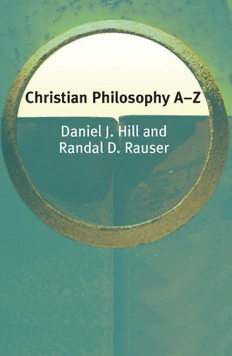
Christian philosophy A-Z PDF
Preview Christian philosophy A-Z
Christian Philosophy 18/4/06 12:39 pm Page 1 Christian Philosophy A–Z Daniel J. Hill and Randal D. Rauser R aD PHILOSOPHY A–Z SERIES na dn GENERAL EDITOR: OLIVER LEAMAN ai le These thorough,authoritative yet concise alphabetical guides introduce the Dl J central concepts of the various branches of philosophy.Written by established .. philosophers,they cover both traditional and contemporary terminology. RH Christian Philosophy A–Z ai ull Features s& e •Dedicated coverage of particular topics within philosophy r •Coverage of key terms and major figures •Cross-references to related terms. Daniel J. Hill and Randal D. Rauser Ahandy guide to the major figures and issues in Christian philosophy from C Augustine to the present. h r This volume covers a broad historical sweep and takes into account those i s non-Christian philosophers that havehad a great impact on the Christian tradition. t It concentrates,however,on the issues that perplex Christian philosophers as they i a seek to think through their faith in a philosophical way and their philosophical n beliefs in the light of their faith.Examples of the topics discussed are the question ofwhether and how God knows the future,whether we actually know that God P exists,and whatAthens has to do with Jerusalem.The leaders of the recent revival h of Christian analytic philosophy,especially Alvin Plantinga,Nicholas Wolterstorff, i l William Alston and Robert Adams are also included. o s This book will be of interest to those studying Christian philosophyand to o Christians seeking to think philosophicallyabouttheir faith. p h Daniel J.Hillis Lecturer in Philosophyat the University of Liverpool. y A Randal D.Rauseris Assistant Professor of Historical Theology,Taylor Seminary, – Edmonton,Alberta,Canada Z Cover design:River Design,Edinburgh E Edinburgh University Press barcode d 22 George Square,Edinburgh EH8 9LF in b www.eup.ed.ac.uk u r ISBN 0 7486 2152 0 g h P1:FCG/SPH P2:FCG/SPH QC:FCG/SPH T1:FCG EUBK021-Hill/Rauser May30,2006 17:22 CHRISTIAN PHILOSOPHY A–Z i P1:FCG/SPH P2:FCG/SPH QC:FCG/SPH T1:FCG EUBK021-Hill/Rauser May30,2006 17:22 VolumesavailableinthePhilosophyA–ZSeries EpistemologyA–Z,MartijnBlaauwandDuncanPritchard EthicsA–Z,JonathanA.Jacobs IndianPhilosophyA–Z,ChristopherBartley JewishPhilosophyA–Z,AaronW.Hughes PhilosophyofReligionA–Z,PatrickQuinn Forthcomingvolumes AestheticsA–Z,FranGuter ChinesePhilosophyA–Z,BoMou FeministPhilosophyA–Z,NancyMcHugh IslamicPhilosophyA–Z,PeterGroff PhilosophicalLogicA–Z,J.C.Beall PhilosophyofLanguageA–Z,AlessandraTanesini PhilosophyofMindA–Z,MarinaRakova PhilosophyofScienceA–Z,StathisPsillos PoliticalPhilosophyA–Z,JonPike ii P1:FCG/SPH P2:FCG/SPH QC:FCG/SPH T1:FCG EUBK021-Hill/Rauser May30,2006 17:22 Christian Philosophy A–Z Daniel J. Hill and Randal D. Rauser Edinburgh University Press iii P1:FCG/SPH P2:FCG/SPH QC:FCG/SPH T1:FCG EUBK021-Hill/Rauser May30,2006 17:22 (cid:2)C DanielJ.HillandRandalD.Rauser,2006 EdinburghUniversityPressLtd 22GeorgeSquare,Edinburgh Typesetin10.5/13Sabon byTechBooksIndia,andprintedand boundinFinlandbyWSBookwell ACIPrecordforthisbookis availablefromtheBritishLibrary ISBN-100748622128(hardback) ISBN-139780748622122(hardback) ISBN-100748621520(paperback) ISBN-139780748621521(paperback) TherightsofDanielJ.HillandRandalD.Rauser tobeidentifiedasauthorsofthiswork havebeenassertedinaccordancewith theCopyright,DesignsandPatentsAct1988. iv P1:FCG/SPH P2:FCG/SPH QC:FCG/SPH T1:FCG EUBK021-Hill/Rauser May30,2006 17:22 Contents SeriesEditor’sPreface vii Introduction ix Acknowledgements xiii ChristianPhilosophyA–Z 1 Bibliography 201 v P1:FCG/SPH P2:FCG/SPH QC:FCG/SPH T1:FCG EUBK021-Hill/Rauser May30,2006 17:22 This book is lovingly and gratefully dedicated to our respective parents. vi P1:FCG/SPH P2:FCG/SPH QC:FCG/SPH T1:FCG EUBK021-Hill/Rauser May30,2006 17:22 Series Editor’s Preface One of the things that Christian philosophy has going for it isacentraltext,theNewTestament,writteninGreek.Greek isahighlyappropriatelanguageforphilosophy,abstractand capable of fine conceptual distinctions, something the more concrete and basic Hebrew of the Old Testament had diffi- culty accomplishing. The traditional conflict between Athens and Jerusalem, between philosophy and religion, was often thus muted in Christianity since their religion was from the startprettyfirmlyestablishedinAthens,atleastlinguistically speaking.ThedevelopmentofChristianphilosophywasrapid since even in the early Christian communities the growth of the religion took place in a cultural environment where phi- losophy also flourished. Ever since then the ideas and issues of Christianity have been extensively explored using the var- ious philosophical techniques that have arisen within differ- entphilosophicaltraditions.Itisoftendifficulttounderstand what is going on in Christian philosophy, though, since the blendofphilosophyandreligionmaymakethereaderunsure precisely what argument is being presented, or how it is sup- posedtowork.ItistheaimofDanielHillandRandalRauser’s guide to the vocabulary of the debate to throw light on this and other aspects of Christian philosophy, and we hope that readers will find it useful in gaining a pathway through this interestingintellectualterritory. OliverLeaman vii P1:FCG/SPH P2:FCG/SPH QC:FCG/SPH T1:FCG EUBK021-Hill/Rauser May30,2006 17:22 viii P1:FCG/SPH P2:FCG/SPH QC:FCG/SPH T1:FCG EUBK021-Hill/Rauser May30,2006 17:22 Introduction Fifty years ago a scan of bookshop shelves would have been as likely to find a dictionary of terms for alchemy as one for Christian philosophy. Indeed, one might well have thought that,thoughofcoursethereweresomeChristianphilosophers then, they were doomed to the same fate as the dodo. But, in a stunning reversal, today Christian philosophy is among the most vibrant areas of philosophy. While the story of that change is still being written, there are a few key factors. On the negative side, the last fifty years have seen the demise of somehistoricallyformidableopponentstoChristianphiloso- phy,mostperspicuouslylogicalpositivismandclassicalfoun- dationalism, and this demise is due in significant part to the work of Christian philosophers. On the positive side, there hasbeenarevitalisationofChristianphilosophyfromanum- ber of sources, including the renewal of Catholic philosophy after the broadening of the Second Vatican Council as evi- dent, for instance, in the diversity of the American Catholic Philosophical Association. Another significant factor is the work of several key philosophers coming out of (or sympa- thetictoimportantfeaturesof)theDutchCalvinisttradition. Philosophers such as Alvin Plantinga, Nicholas Wolterstorff andWilliamAlston(who,thoughnotaCalvinist,hassympa- thy with the broad approach of Plantinga and Wolterstorff) have provided a formidable body of original philosophical work, all in accord with, or explicitly building upon, their Christian convictions. This new vibrancy led to the founding ix
